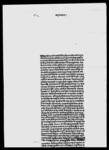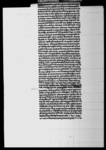A report from Umākānta Upādhyāya to Bhīmasena Thāpā re Ochterlony's death etc. (VS 1882)
ID: DNA_0002_0066
Edited and
translated by Manik Bajracharya, Simon Cubelic and Rajan Khatiwoda
Created: 2019-04-04;
Last modified: 2019-09-25
For the metadata of the document, click here
The accompanying edition, translation/synopsis and/or commentary are available under the terms of the Creative Commons Attribution-ShareAlike 4.0 International License
Abstract
This letter dispatched by Umākānta Upādhyāya from Calcutta to Bhīmasena Thāpā reports various events in British India. Among them is the news of Ochterlony's death.Diplomatic edition
श्रीदुर्गासहायः\⟪१८३⟫[1r-Part1]
1स्वस्तिश्रीसर्वोपमायोग्येत्यादिशौर्यौदार्य्यदयादाक्षिण्यादिसद्गुण2राजिराजितस्तूयमानकीर्तिराजभारोद्धरणसमर्थश्रीश्रीश्रीज
3नरलसाहवभीमसेनथापामहाशयेषु∙इतःश्रीउमाकान्तउपा
4ध्याकोशुभाशीर्वादपूर्वकंपत्रम्कृपालेञाँहाँकुशलछ∙ताँहाँ
5कोआनन्दमङ्गलसर्वदाचाहियेआगेञाँहाँकोसमाचारभलो
6छउप्रान्त∙अरूपायासुन्याकोविस्तार∙प्रथमश्रावणसुदि१०रो
7ज२कादिन ∙रवानागर्याकोविन्तिपत्रपुगी∙जाहरभयोहो∙गौ
8र्नरअम्हिरष्टसाहवराजमहलतकगयाका∙हावाषाई∙तवि
9यतनाँसाजजोथियोसोआरामभै∙एस्तरफ्फिरी∙प्रथमश्राव
10णसुदि६रोज५कादिन्∙चाँनक्मा∙दाषीलभै∙ऐसुदि१४रोज
11५कादिन∙कलकत्ताकौसल्मा∙सामेलभया∙सिपहसालारजर्नै
12लपिजिट्साहवपनी∙राजमहलदेषी∙पश्चीम∙गयेनन्∙गौर्नर
13फिर्यापछि∙वाटमाभेटनगरी∙येतैआयीहुगलीका१०।८कोस
14तफावत्∙दरियावमा ∙तलमाथीफिर्दछन्∙भन्न्याकुरासुनिन्छ∙
15प्रथमश्रावणसुदि१४रोज५ कादिन∙चौथाप्रहरमा∙ञाँहाँका
16किल्लामा६८आवाजतोपर∙दस्येघारसलक्आवाजवन्दु
17क्काभया∙क्याहोभनितहकीतगर्दा∙मालवाकार∙राजपूता
18नाकारजीडन्ट∙जर्नैलअष्तर्लोनीसाहव∙मोकाम्∙मेरट्मा
19जुलाईमहिनाकापन्ध्रञिँ ∙तारिष्प्रथमश्रावणवदि३०रोज
20६कादिन् ∙फौतभया∙कंपनीकाषैरषाह∙पुरानाआदमीथिया
21गौर्नरसाहवले∙वडोगम्गरीउनकासीन्वमोजिम्गमीका
22तोप्६८भया∙भन्न्याकुरासुनिया∙अष्तर्लोनीसाहव∙फौतभ
23याकोमोकाम्सीनकोविस्तार∙अंगरेजीहरफका∙छापाकोन
24कल∙येसैचिठीमाजान्छ∙पढाई∙मोँफ्स्सील∙जाहरहोला∙का
25लीसंकरघोसालवंगाली∙काशीवासनिमित्त∙वनारस्माव
26स्याकोछ∙तसले∙राजगीकाषेतावकोजिकरसदरमागर्याको
27रहेछ३महिनाअघीगौर्नरसाहववाट∙घोसालमजकूरलाई∙षि
28ल्लत्र∙राजगीकोषेताव∙येतावाटगै∙वनारस्मा∙अगस्त्यस्
29वुरुग्साहेवलेसपुर्दगर्याभन्न्यासुनियोथ्यो∙सोअषवारलेप
30नी∙जाहरभयोहो∙साल७९मा∙ईरान्कावादशाहको∙वेरादर
31फ्तेउलाषाँ∙कलकत्ताआयामा∙राजासुष्मैकाछोरा∙वदरी
32नाथरायले∙आफनावाग्मा∙फ्तेउल्लाषाँलाईलैगीज्याफ्
33त्गर्याथ्या∙षाँमजकूरईरान्पुगीवादशाहकातरफ्वाट∙वदरी
34नाथरायलाई∙षिल्लत्र∙राजगीषेतावका∙सिपारसकोषत∙
[1r-part2]
35गौर्नरसाहवकानाम्मा∙पठायाकोरहेछ∙दाषीलहुँदा∙वदरी
36नाथरायलाईदफ्तर्षानावाटतिमिलाई∙राजगीकोषेताव∙मि
37ल्छ∙भन्न्याकुरासुनाया∙भन्न्यासुनियो∙दिनन्∙ञाँहाँकाव
38डाआदमीमा∙योहिन्दुस्तानीसंगपनिमेल्राष्न्या∙षुलासाआ
39दमीछ∙भरथपूरका∙वकील्∙मंगलसिंव्राह्मन्∙ञाँहाँथिया∙हा
40लकाराजादुर्जनसिंहसंग∙इन्हेरूकानवन्दा∙दफ्तर्षानावाट∙व
41कीललाईतिमिलेहाजीरहुँन्याकाम्छैन∙भनि∙दर्वारआँउ-
42न्याकाम्छैनभनि∙मकूफ्भयाकोमहिनाअढाईयेककोक
43रीवभयो∙वकीलसहरैमाछन्∙दर्वारमकूफ्भयाकोदेष्ता∙इन्हे
44रूकोपनि∙सफाईभैसकियाजस्तोलाग्दैन∙पूर्वकोसमाचार
45साविकैवमोजिम्छ∙वेलाईतवाटआउन्या∙जर्नैललार्डकम्
46वरमैयरसाहवर∙फौजहरूअरूआईपुग्याकाछैनन्∙ञाँहाँउ
47प्रान्तजोसुनियेला∙पछिविन्तिगरीपठाँउला∙मुरलीधरतेवारी
48कीजेठीवुहारीषसीन्आसौचले∙आजकालआँउदैनन्∙वि
49ज्ञेषुकिमधिकमितिद्वितियश्रावणवदि२रोज१सम्वत्
50१८८२साल∙मोँकामकलकत्तातुलावाजारशुभम् ----
Translation
[1r-Part1]
May śrī Durgā help [us]!
1831
Hail! A letter from śrīUmākānta Upādhyāya with auspicious blessings to the thrice venerable General Bhīmasena Thāpā, the magnanimous one who is adorned with a row of good qualities—the worthiness [to be an object] of all [exalted] similes and the like, heroism, generosity, compassion, skillfulness and the like—whose fame is praised and who is able to shoulder royal duties.
[Everything is] fine here by [your] grace. Happiness and good fortune there are always desired. To start with, the tidings here are good.
Uprānta: Other details received and heard may have reached you through a letter (bintīpatra) dispatched on Monday, the 10th of the bright fortnight of the first2 Śrāvaṇa and may have come to your notice.
Governor Amherst3 Sāheba whose health had been bad (nāsāja), went to Rajmahal4 , underwent a cure (hāvā khāī, lit. having taken in the air) and returned here sound. On Thursday, the 6th of the bright fortnight of the first Śrāvaṇa he arrived in Chanak5 and on Thursday the 14th of the bright fortnight of the same month he participated in the Calcutta council. The commander-in-chief (sipahasālāra) General Paget6 Sāheba has not been west of Rajmahal either. It has been heard that once the governor returns, he will come here without meeting [Paget] on the way and will sail a distance (taphāvat) of 8 to 10 kośas up and down the Hugli River.
In the fourth prahara on Thursday, the 14th of the bright fortnight of the first Śrāvaṇa, there was the sound of 68 cannon bursts and the sound of ten or eleven rifle salutes (salaka) here in the fort. Enquiring what it might be, General Ochterlony7 , the resident of Malwa and Rajputana, had passed away at his residence in Meerut on the 15th of the month of July, that is, on Friday, the 30th of the dark fortnight of the first Śrāvaṇa. He was a well-wisher and a senior servant of the Company. It is heard that the Governor Sāheba felt great sadness and arranged 68 cannon bursts for mourning corresponding to his age (sīn). Copies of English newspapers containing details of the circumstances (mokām) surrounding Ochterlony Sāheba's death [and of his] age will be dispatched with this letter. Once you read them, you will know the specifics.
The Bengali Kālī Saṅkara Ghosāla8 has settled in Benares for kāśībāsa9 . It seems he mentioned [his desire] for a royal title at the capital (i.e. Calcutta). It is heard that three months ago, the Governor Sāheba went to Benaras from here and granted the aforementioned Ghosāla a robe of honour (khillat) and a royal title (rājagī khetāva), which were presented [to him] by - Agastyas Burug10 Sāheba. This may have been known to you through the newspapers as well.
In the year [VS 18]79, when Fateh Ullah Khan, a relative (berādara) of the emperor of Iran, came to Calcutta, Badarīnātha Rāya, the son of King Suṣmai, took Fateh Ullah Khan to his garden and made a feast [for him]. Once the aforementioned Khan arrived [back] in Iran, he on behalf of the emperor sent a letter to the Governor Sāheba recommending a robe of honour and a royal title for Badarīnātha Rāya.
[1r-Part2]
It is heard that when Badarīnātha Rāya appeared [there], he was told: “You will receive the royal tittle from the Daphtarakhānā”. They will give it [to you]. Among the dignitaries [who come] here, this (i.e., Fateh Ullah Khan) is an [especially] open person who is friendly with Hindustanis.Maṃgala Siṃ Brāhman, Bharathapūra's envoy, was here. Since they (i.e., the British did not get along with the present king, Durjana Siṃha,11 it has been nearly two and a half months since the envoy was suspended from the Daphtarkhānā with the words: “You are not required to be present here and are not required to attend the court assembly." The envoy is still in the city. Since he has been barred from [attending] the court (darvāra), it is apparent that the issue between them has not been settled.
The news from the east is as before. General Lord Combermere Sāheba and other troops coming from Great Britain have not arrived yet. I will report to you later on what is heard from now onwards.
The eldest daughter-in-law of Muralīdhara Tevārī has passed away. He does not attend [the office] these days because of the mourning period.
What more to say to a knowledgeable one.
Sunday, the 2nd of the dark fortnight of the second Śrāvaṇa in the [Vikrama] era year 1882 (1825 CE). Residence: Tulābājāra, Calcutta. Auspiciousness.


